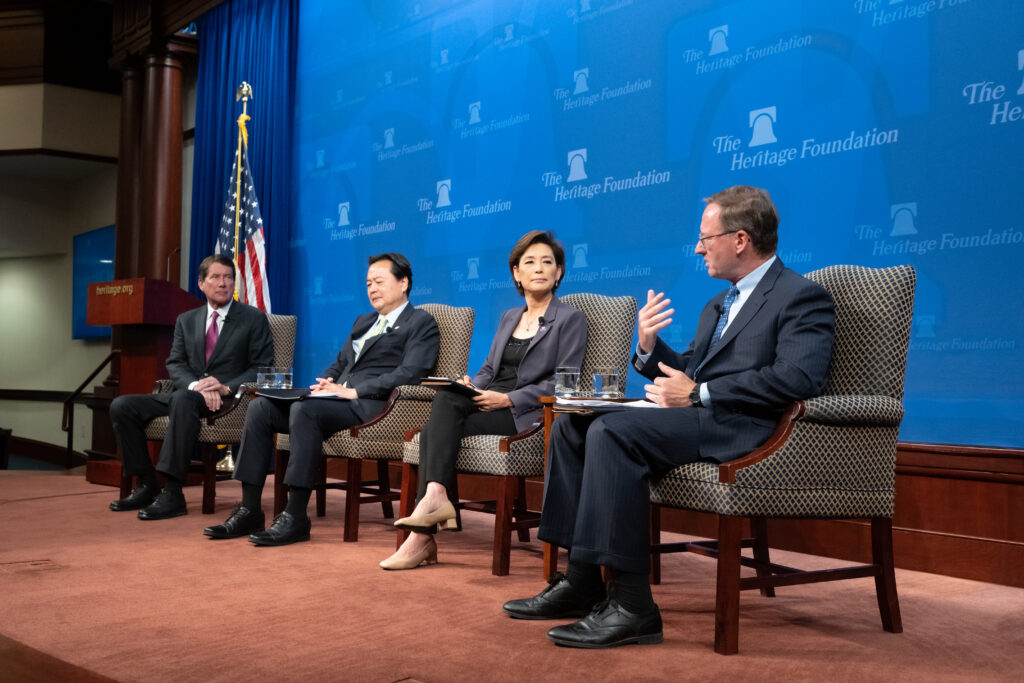As the United States and South Korea mark the 70th anniversary of their alliance in the Indo-Pacific, The Heritage Foundation on Tuesday hosted a panel discussion on the alliance’s future.
The panelists emphasized the importance of the trilateral alliance among the United States, South Korea, and Japan in the face of threats from North Korea and China.
Heritage’s 2023 B.C. Lee Lecture, “The Future of the U.S.-South Korea Alliance in the Indo-Pacific,” featured Hyundong Cho, South Korea’s ambassador to the United States; Rep. Young Kim, R-Calif., chairwoman of the House Foreign Affairs Indo-Pacific subcommittee; and Sen. Bill Hagerty, R-Tenn., who serves on the Senate Foreign Relations Committee. (The Daily Signal is the news outlet of The Heritage Foundation.)
Also on hand were 10 young men and women who are defectors from North Korea.
An ‘extraordinarily predatory’ threat
Hagerty said the challenges presented today by North Korea and China are greater than ever. China continues to exercise “extraordinarily predatory” practices, including stealing our intellectual property, forcing technology transfers, subsidizing industries, and competing unfairly in terms of market access.
“We’ve seen China invade our sovereignty with the spy balloon, but they invade our sovereignty every day with threats to our cybersecurity,” Hagerty said.
The Tennessee lawmaker said that bilateral joint military exercises between the U.S. and South Korea invite more belligerent behavior from North Korea, but that’s behavior he welcomes.
“The impact of those joint exercises is significant,” Hagerty said. “I see it with my own eyes, and I’ve seen our progress in terms of capability.”
Cho said that South Korean President Yoon Suk Yeol’s April visit to the U.S. was an overall testament to the two countries’ commitment to fortifying the alliance between America and South Korea for generations to come.
“Our lives are deeply rooted in the shared values of freedom, democracy, rule of law, and human rights,” said Cho. “I think that was clearly demonstrated when [Yoon] made a speech at the joint session of Congress and received sensational applause. In that context, we are going to extend our people-to-people exchanges, in particular for younger generations, which will be the foundation of the future alliance for the coming decades. That was the overall testament of his United States visit.”
Yoon’s visit had a profound impact on Kim, an immigrant from South Korea whose family fled North Korea. She spearheaded the effort to ensure Yoon could speak to a joint session of Congress.
“Over the past year, President Yoon has been such a willing ally,” Kim said. “He sent a very strong and clear message that the Republic of Korea stands willing and ready to work with the United States and other allies to ensure the Indo-Pacific stays free.”
Kim brought up an anecdote from the state dinner during Yoon’s visit, at which he started singing the 1970s pop classic “American Pie” by Don McLean.
“The confidence that President Yoon exuded, the conversations he had, and the leadership he exhibited really goes to show how far South Korea has come,” Kim said.
The future of the alliance
The key points the speakers emphasized were the importance of imposing sanctions, keeping human rights in North Korea at the forefront of foreign policy efforts, and continuing to raise awareness of the human rights situation in the country.
“First and foremost, we need to reinforce existing sanctions,” said Hagerty. “One of the things that continued to be a weakness for us was cybercrime.”
Last year, Hagerty introduced legislation to impose additional sanctions on North Korea; specifically to target Pyongyang’s ability to generate revenue by committing cybercrimes to fund its unlawful weapons of mass destruction programs.
Cho emphasized that advocating for human rights in North Korea will always be the foremost foreign policy priority of South Korea. He believes that “raising the global awareness of the human rights situation will be another kind of deterrent against North Korea and their bad behavior.”
Kim drove home this point by noting we don’t really know how bad it is in North Korea, but we cannot let that be a reason to forget and stop fighting for human rights.
“We know how awful and atrocious it is, but nobody has been made aware since the COVID lockdowns,” Kim said. “We don’t know what’s going on. We don’t know who has starved to death. We just don’t know. We need to keep the pressure on North Korea as an international community. Any regime that violates human rights the way Kim Jong Un does, and the way his father and grandfather did, we need to bring that to the front burner and keep talking about it.”
Have an opinion about this article? To sound off, please email letters@DailySignal.com, and we’ll consider publishing your edited remarks in our regular “We Hear You” feature. Remember to include the url or headline of the article plus your name and town and/or state.
The post US-S. Korea Ties ‘Deeply Rooted in Shared Values of Freedom, Democracy, Rule of Law,’ Seoul Envoy Says appeared first on The Daily Signal.
- The Sneaky Way Deep-State Bureaucrats Advocated Censorship of Americans in 2020 - November 13, 2023
- There Is No ‘Second America’ if This One Fails - November 13, 2023
- ‘Zero Appetite’ in Israel for Cease-Fire With Hamas, Embassy Official Says - November 13, 2023
JOIN US @NewRightNetwork on our Telegram, Twitter, Facebook Page and Groups, and other social media for instant news updates!
New Right Network depends on your support as a patriot-ran American news network. Donate now



